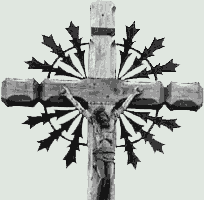|
The cemetery was established in 1909 with the first recorded burial of A.S. Strastsky in October of 1910. An "old-world" monument marks his passing - an epitaph in his native language a reminder of a time long ago. But it’s from most of the other 44 graves that Antenette Chernosky Mulvihill ‘s memory delivers anecdotes of Lithuanian friends and family in Roslyn.
In 1920, 8 year old Antenette’s 4 year-old sister died. Her tombstone shows the surname "Cernauskite," indicating a child is buried in the plot. Her father was buried in 1931 with the family name engraved as Cernauskas because he was a man. His widow followed him in death in 1935 and carries the woman’s varient, Cernauskiene on her marker. On the 16 year old brother’s stone can be seen the American spelling, Chernosky. In 1930, after the deaths of a 4 and 16 year old, for whom no burial insurance had been obtained, Antenette’s father signed the rest of the family up for lodge burial benefits.
In the beginning (1907), 8 men chartered the Lithuanian Alliance Lodge in Roslyn and conducted the rituals that time had established from abroad. As with many of those early organizations, burial benefits were made available to their members. Mrs. Mulvihill’s father was one of the charter members. She states, "Since1930, I have been paying $2.40 every three months. That will provide my heirs a flat $300.00 for my burial expenses." This sum once considered more that adequate. The Roslyn Lodge has long since disbanded but the Lithuanian Alliance of America’s national office still accepts her $2.40 on a quarterly basis.
Though a minority as a nationality in Roslyn, the Lithuanian Lodge was remembered by many of this town’s long time residents as having the liveliest and most enjoyable dances and parties. The Alliance rented space at the Finn Hall which, until it was razed in the 1940’s, was located on the corner of 2nd and Oregon Ave. Most of the events were put on as fund raisers for the lodge’s projects. Mrs. Mulvihill recollects those events were always family oriented, with the children accompanying their parents to all parties and dances.
In the early days a brick factory was located at the south end of Roslyn in which many of the Lithuanian men were employed, Some remember that every brick going out of this factory was branded with the Roslyn name. Lithuanian names can still be seen in the cement of some of the early sidewalks from those who worked on the construction jobs.
These cemetery articles are endeavoring to infrom and to preserve, for later generations, not the dying but more what living was like in this special region. Each plot has its own story; some recalled by someone still on this earth, others lost to living memory. Mrs. Mulvihill and her sister, Anne Lower, are probably the only two persons in Roslyn who know the exact whereabouts of a child'’ unmarked grave at the corner of their cemetery. Even when they were children they did not know the child’s name, but they knew it was that of a small child and would put wildflowers on it.
Except for very occasional help from the relatives of the deceased, the care given at the Lithuanian Cemetery is done by the Mulvihill’s. They remember when each family would care for its own and many times there were gatherings of grave tenders caring for their departed’s resting place and relating incidents of happy times to one another. Now Marvin and Antenette keep the lawn mowed, the gravesites weeded and attempt to keep the picket fence in repair, a job made difficult by vandals. When asked who would take over this task of love when they are no longer able tothey could only hope that a community volunteer effort would be made to continue the upkeep.
The restoration and upkeep of all of Roslyn’s cemeteries is the goal of the Roslyn Kiwanis and Fred Kreger’s Cle Elum High School history class. Donations of time, materials, and money are gratefully accepted.
Karyne Ware with Fabian Kuchin
September, 1999
Marvin and Antenette Mulvihill are gone now, resting in the Lithuanian Cemetery in Roslyn. Care of the cemetery is now being provided by Virginia Mulvihill Osborne and her family.[Needs updated]
After this article was published, a person touched by the story of the young child’s unmarked grave donated a stone, which is now on that grave. As a child, while my parents worked in the cemetery, I too put wild flowers on that grave. And I am sure my sister and brother did too, because that was important to our mother.
Markers (tombstones) need repair, trees must be cut, and fences painted. Of course, this all takes time and money.
(Records are ordered by row or you may click on the first letter
of the surname of the person you are searching for)
Connected successfully
A B C D E F G H I J K L M N O P Q R S T U V W X Y Z Original View
(Total Number of Records in Database: 1)
| Esko, Charles | Row 3 |
If you have a database or information that you would like to put into our database, that pertains to Lithuanian genealogy, please contact us at webmaster@lithuaniangenealogy.org
 Roslyn
Lithuanian Cemetery
Roslyn
Lithuanian Cemetery